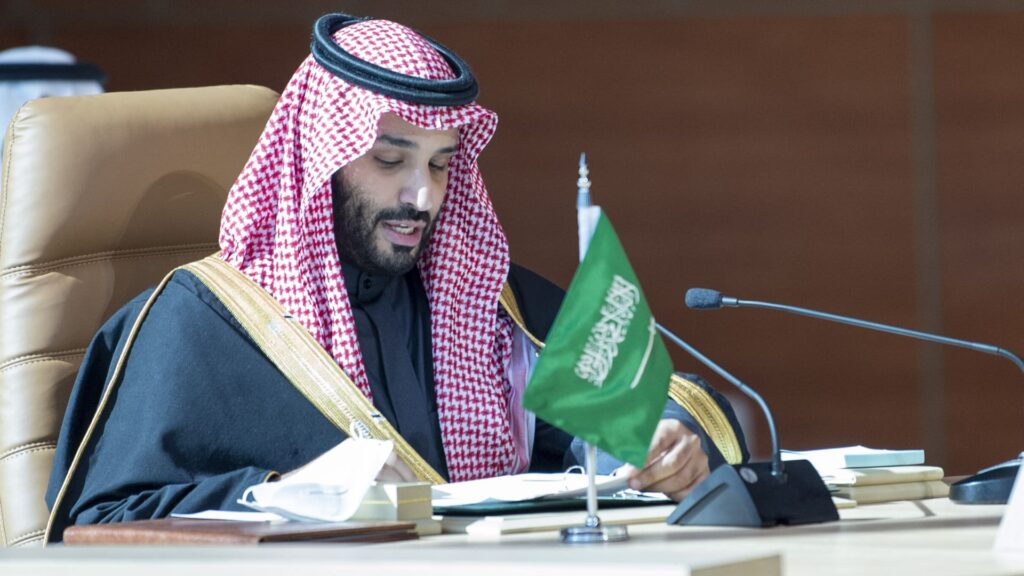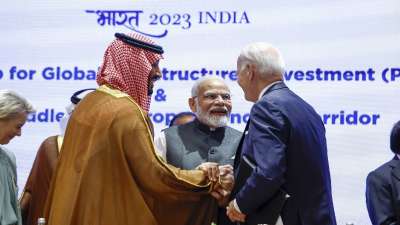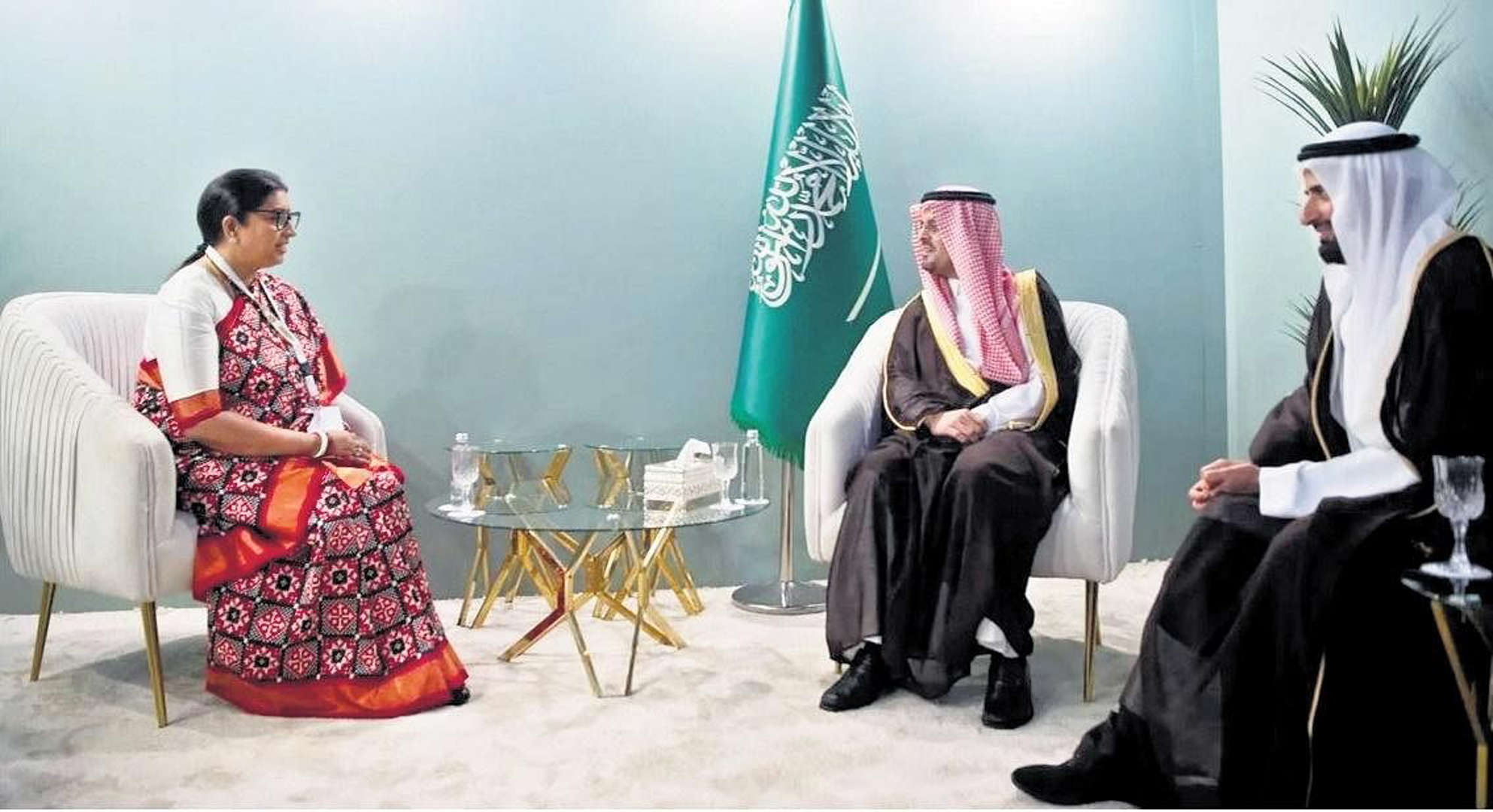In a noteworthy display of the deepening ties between India and Saudi Arabia, a historic non-Muslim Indian delegation, led by Union Minister for Women and Child Development Smriti Z Irani and Minister of State for External Affairs V Muraleedharan, visited Madinah. The visit included key Islamic sites like Al Masjid Al Nabwi, the mountain of Uhud, and the Quba Mosque’s periphery, showcasing the cultural and spiritual engagement between the two nations. Facilitated by the Saudi Ministry of Hajj and Umrah, the delegation traveled to Madinah via a high-speed Haramain train. Described as a major diplomatic development, the visit underscores the robust mutual trust and confidence. The ongoing diplomatic mission also saw the signing of the crucial bilateral Haj agreement for 2024 between India and Saudi Arabia.

1.Smriti Irani: From Entertainment to Politics and Advocacy
- Trace her journey from the entertainment industry to active involvement in student politics.
- Highlight her transition into mainstream politics and roles in advocacy.
2.Leadership in India’s Social and Economic Landscape: Women and Child Development Initiatives
- Explore Smriti Irani’s impact as the Union Minister for Women and Child Development.
- Discuss initiatives and policies contributing to social and economic development.
3.Saudi Modernization and Diplomacy: Smriti Irani’s Role in Bilateral Relations
- Investigate her involvement in strengthening ties with Saudi Arabia.
- Explore any contributions or engagements related to Saudi modernization initiatives.
Vision 2030: Bin Salman’s Ambitious Modernization Drive Transforms Saudi Arabia
In recent years, Saudi Arabia has undergone a radical transformation under the visionary leadership of Crown Prince Mohammed bin Salman. At the heart of this revolutionary change is the ambitious initiative known as Vision 2030, a comprehensive plan aimed at modernizing the country across various sectors.
Bin Salman’s modernization efforts encompass economic diversification, social reforms, and technological advancements, with the ultimate goal of reducing Saudi Arabia’s dependence on oil and positioning it as a dynamic, knowledge-based economy.
Economic Diversification:
Historically reliant on oil revenues, Saudi Arabia is strategically shifting towards a more diversified economy. Vision 2030 promotes investments in non-oil sectors, such as tourism, entertainment, and technology. Initiatives like NEOM, a futuristic city project, exemplify the commitment to creating a vibrant and diverse economic landscape.
Social Reforms:
Bin Salman has ushered in a wave of social reforms to empower the Saudi population, particularly women. The lifting of the ban on women driving, the expansion of entertainment options, and efforts to enhance the quality of life underline a progressive approach. These reforms aim to create a more inclusive and open society, aligning with global norms.
Technological Advancements:
Embracing the Fourth Industrial Revolution, Saudi Arabia is investing heavily in technology and innovation. The country seeks to become a global tech hub, fostering startups and attracting international talent. Initiatives like the establishment of a tech-focused city, the development of smart infrastructure, and advancements in artificial intelligence highlight Saudi Arabia’s commitment to staying at the forefront of technological innovation.
International Partnerships:
Bin Salman’s modernization drive extends beyond domestic borders, with efforts to forge strategic partnerships on the global stage. By engaging with international investors, technology leaders, and cultural influencers, Saudi Arabia aims to position itself as a key player in the international community.

Challenges and Controversies:
While Vision 2030 has garnered praise for its bold vision, it has not been without challenges and controversies. Critics raise concerns about human rights issues, geopolitical tensions, and the pace of reforms. The Saudi government faces the delicate task of balancing tradition with modernization while addressing the diverse perspectives within the country and on the global stage.
In conclusion, Mohammed bin Salman’s modernization of Saudi Arabia through Vision 2030 reflects a transformative journey towards a diversified, inclusive, and technologically advanced nation. As the plan progresses, the world watches to see how these ambitious reforms will shape the future of one of the Middle East’s most influential nations.
Vision 2030: Bin Salman’s Ambitious Modernization Drive Transforms Saudi Arabia
In recent years, Saudi Arabia has undergone a radical transformation under the visionary leadership of Crown Prince Mohammed bin Salman. At the heart of this revolutionary change is the ambitious initiative known as Vision 2030, a comprehensive plan aimed at modernizing the country across various sectors.
Bin Salman’s modernization efforts encompass economic diversification, social reforms, and technological advancements, with the ultimate goal of reducing Saudi Arabia’s dependence on oil and positioning it as a dynamic, knowledge-based economy.
Economic Diversification:
Historically reliant on oil revenues, Saudi Arabia is strategically shifting towards a more diversified economy. Vision 2030 promotes investments in non-oil sectors, such as tourism, entertainment, and technology. Initiatives like NEOM, a futuristic city project, exemplify the commitment to creating a vibrant and diverse economic landscape.
Social Reforms:
Bin Salman has ushered in a wave of social reforms to empower the Saudi population, particularly women. The lifting of the ban on women driving, the expansion of entertainment options, and efforts to enhance the quality of life underline a progressive approach. These reforms aim to create a more inclusive and open society, aligning with global norms.
Technological Advancements:
Embracing the Fourth Industrial Revolution, Saudi Arabia is investing heavily in technology and innovation. The country seeks to become a global tech hub, fostering startups and attracting international talent. Initiatives like the establishment of a tech-focused city, the development of smart infrastructure, and advancements in artificial intelligence highlight Saudi Arabia’s commitment to staying at the forefront of technological innovation.
International Partnerships:
Bin Salman’s modernization drive extends beyond domestic borders, with efforts to forge strategic partnerships on the global stage. By engaging with international investors, technology leaders, and cultural influencers, Saudi Arabia aims to position itself as a key player in the international community.
Challenges and Controversies:
While Vision 2030 has garnered praise for its bold vision, it has not been without challenges and controversies. Critics raise concerns about human rights issues, geopolitical tensions, and the pace of reforms. The Saudi government faces the delicate task of balancing tradition with modernization while addressing the diverse perspectives within the country and on the global stage.
In conclusion, Mohammed bin Salman’s modernization of Saudi Arabia through Vision 2030 reflects a transformative journey towards a diversified, inclusive, and technologically advanced nation. As the plan progresses, the world watches to see how these ambitious reforms will shape the future of one of the Middle East’s most influential nations.
To know more About Saudi Arabia Please click Here
You May like :
1.Smriti Irani: From Entertainment to Politics and Advocacy
2.Leadership in India’s Social and Economic Landscape: Women and Child Development Initiatives
3.Saudi Modernization and Diplomacy: Smriti Irani’s Role in Bilateral Relations

Who is Smriti Irani ?
Smriti Irani is an Indian politician and member of the Bharatiya Janata Party (BJP). She has been actively involved in Indian politics and has held various significant positions in both the government and the party. As of the last available information, Smriti Irani has served as the Union Minister for Women and Child Development in the Cabinet of Prime Minister Narendra Modi. Additionally, she has been associated with the Ministry of Textiles.
Smriti Irani gained prominence in Indian politics for her active role in student politics and later for her involvement in television serials. She played the role of Tulsi Virani in the popular Indian television series “Kyunki Saas Bhi Kabhi Bahu Thi.” Her entry into politics marked a transition from the entertainment industry to public service.


